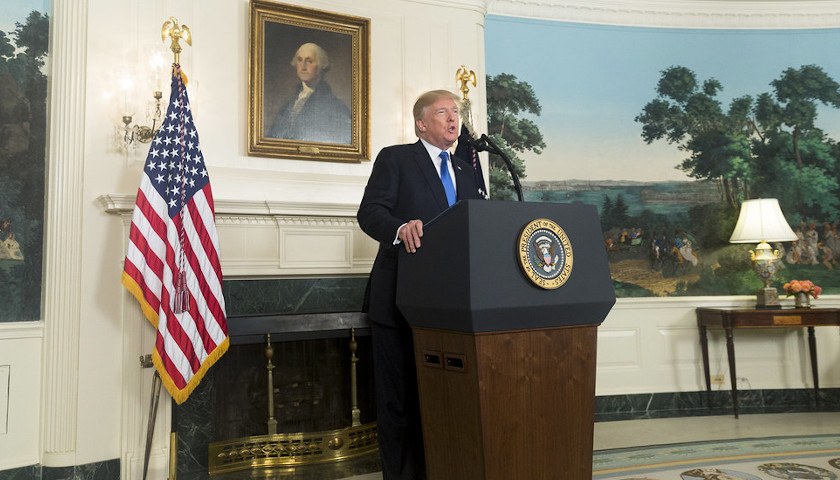by Edward Ring
For two fleeting years after Trump was elected president, the GOP controlled the White House and both houses of the U.S. Congress. This level of one-party control for the GOP was almost without precedent. Apart from 2003-2007—the end of George W. Bush’s first term in office and the beginning of his second—you have to go back all the way to 1953, the first half of Dwight Eisenhower’s first term, to find a GOP president and a GOP-controlled Congress.
What the GOP did with those two years was uninspiring, and once the Democrats took over the House in January 2019, the opportunity was lost. The issues haven’t gone away. It’s been barely more than two years since the GOP lost their golden opportunity. GOP voters are disheartened by what is now obviously a rigged bureaucracy, a rigged media, and mountains of evidence of rigged elections. And the pandemic has overshadowed everything. But the core issues remain.
Reflexive Platitudes Are Not Enough
So what does the Republican party stand for?
On March 20, GOP chairwoman Ronna McDaniel tweeted the following: “The Republican Party stands for reopening our schools, reopening our businesses, and protecting the border!”
Notwithstanding the fact that reopening schools and businesses is an overdue objective fraught with long-term threats to freedoms we’d previously taken for granted, schools and businesses will reopen. So what else does the GOP stand for?
“Protecting the border.”
That is the one enduring plank upon which Ronna McDaniel, and presumably her retinue of gold plated consultants, have decided to stake the future of the Grand Old Party. This issue matters, but is it enough to win back control of Congress in 2022, and the White House in 2024?
Read the searing replies to McDaniel’s tweet before feeling assured that this one issue is something the GOP can ride back to victory in the next two to four years. Anti-GOP trolls pretty much own McDaniel’s Twitter dialog, and while there is very little substance to the slime they’re slinging, it has powerful rhetorical appeal. Only slightly toned down versions of the same sentiments now control nearly every major institution in America. This amounts to a categorical rejection of an entire people and culture—Trump’s half of America.
This isn’t news, but it bears repeating because it represents what the GOP is up against. “Control the border” invites countless rebuttals both nuanced and profane. What about the highly skilled? Don’t you want to help any refugees, no matter what? Don’t you care about the children? What about the economy? What about America’s aging population? Are you a racist?
Consider this excerpt from a comment made recently on American Greatness:
Sorry to be skeptical that building a border wall is gonna make it all better for backwards losers in West Virginia & Kentucky who think they can still mine coal in the 21st century and where there aren’t even any immigrants in those states cause they’re such “sh\tholes” as Trump would call them! Meanwhile, look at the economies and jobs in the states that have the immigrants!
There are answers to all of this. But it is part of an even bigger onslaught, calibrated to exploit the innate goodness of Americans. The irony is infuriating. Americans are the least racist people on earth, and the only reason they’re tolerating explicitly racist legislation is because it’s being marketed as “anti-racist” and necessary to atone for “systemic racism.”
To name just a few of these hideously racist new “anti-racist” laws that are on the way, with acknowledgement to the incomparable City Journal, there is the Emergency Relief for Farmers of Color Act, the Recognizing People of African Descent and Black Europeans Act, the concurrent resolution urging the establishment of a United States Commission on Truth, Racial Healing, and Transformation, and the Anti-Racism in Public Health Act of 2021.
This is a legislative offensive, promoted by a Democratic Party that knows exactly what it’s doing, that assumes the battle to “protect the border” has already been decided. No new wall, and a return to catch-and-release, chain migration, visa overstays, full state benefits regardless of residency status, no more deporting criminal aliens, etc., etc., etc.
Articulate the Frauds Informing Democratic Policy
The GOP can continue to fight this battle, and they should, but it isn’t enough. Too many Americans either don’t agree, don’t care, or are terrified of sticking their necks out and being called racist. And even if this assessment is incorrect, and we may hope that it is, the GOP needs to be more than just the party of “protecting the border.” Absent a comprehensive new strategy combined with a level of assertiveness the GOP establishment has never mustered, “protect the border” is a vacuous phrase, approved by consultants who are just going through the motions and collecting a check.
Attracting enough voters to sweep out the Democrats is going to take a lot more than bleating shopworn phrases about “protecting the border” while playing hapless defense against an implacable Democratic offense backed by every powerful institution in America. GOP candidates, supported by their party organizations, have to take two very clear positions on the overarching issues facing Americans; and then they have to offer alternative policies.
Those two issues, around which almost everything else revolves, certainly including the border wall, are “climate change” and “systemic racism.” And the declarations the GOP needs to make need to be simple and unequivocal. “Climate change” is not an emergency, and “systemic racism” is a fraud.
Crafting a Coherent and Pragmatic Alternative Agenda
Without a policy agenda pursuant to those declarations, however, they will do more harm than good. Instead of devastating the core premises of the Democratic Party, making these statements without describing the alternative policies and principles would just reinforce the Democratic narrative. But policies can derive from these two positions, rather effortlessly, if you actually believe them. Here are examples:
The GOP stands for policies that will create abundance instead of scarcity. To that end we support development of all forms of energy including nuclear power, natural gas, and clean coal. We will resume construction of the Keystone pipeline, and support infrastructure projects across the United States including a natural gas terminal on the West Coast.
We will support research into nuclear fusion, hydrogen energy, and other next generation technologies. We support desalination plants throughout the coastal United States where there is water scarcity including parts of the Gulf Coast and Southern California coast. We will invest in upgraded roads including smart lanes for high speed self-driving vehicles. Working with automakers, aerospace companies and the FAA, we will work to accelerate the rollout of passenger drones.
Through a pragmatic application of deregulation, subsidies and direct research, we will restore the position of the United States as the primary engine of global economic development and investment. We will lead the world into a new era of peace and prosperity, premised on our commitment to using technology and innovation to create abundance, and on our categorical rejection of scarcity as the inevitable fate of humanity.
Further, the GOP stands for policies that adhere to the immortal words of Martin Luther King, that individuals will be judged “not by the color of their skin but by the content of their character.” To this end, race based preferences in hiring, promotions, contract awards, and college admissions will be illegal. We will restore objective standards for college admissions such as SAT scores, and prohibit discrimination against any group based on its achieving higher aggregate scores. And we will enforce the law with utter impartiality, and without making adjustments if some groups commit more crimes than other groups. We believe that in cases of higher than average crime rates, it is more important to enforce the law, in order to restore safe and stable neighborhoods.
We will repeal all legislation aimed at favoring any group based on their race, gender, or any other group attribute. In order to create opportunities for Americans of all backgrounds, we will roll back unnecessary restrictions on businesses and independent contractors, unnecessary restrictions on land development, and we will require any public funds used for education to be placed in universal education savings accounts that parents can allocate to any school they choose for their children—public, public charter, pod, micro, remote, private, or parochial.
These are specific policies that offer a clear alternative to where the Democrats are taking America. They are not ideologically driven, they are pragmatic. And they will attract people, Left, Right and center, who are realizing, en masse, that the things the Democrats are doing in the name of anti-racism and the “climate emergency” are going to destroy the American way of life forever.
We all care about “protecting the border,” Ms. McDaniel. But that objective needs to be part of a larger vision for the GOP.
– – –
Edward Ring is a senior fellow of the Center for American Greatness and co-founder in 2013 of the California Policy Center.






As usual, Mr. Ring makes some excellent points, and I can’t disagree with any of his proposals. However, he completely misses the fact that none of his proposals will go anywhere — or even be heard or debated, for that matter — unless we first do something about the fact that the leftists/Marxists/Democrats have near-absolute control over our education system from pre-K through graduate school, the so-call main-stream media, and the social media. As long as this continues, we can talk all we want about policies, but we’ll just be talking to ourselves.